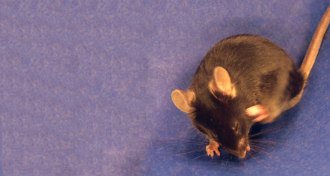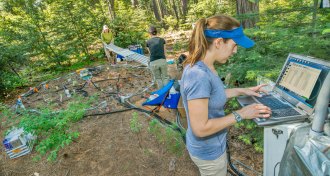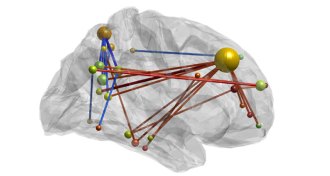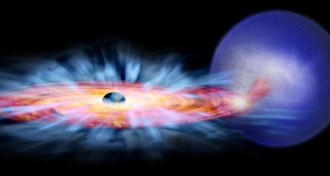News
-
 Neuroscience
NeuroscienceMaking a mistake can put your brain on ‘pause’
When there’s not much time to recover, one error can lead to another.
-
 Climate
ClimateChanging climate could worsen foods’ nutrition
Climate change could aggravate hidden hunger by sapping micronutrients from soils and plants, reducing nutrition in wheat, rice and other crops.
By Susan Milius -
 Quantum Physics
Quantum PhysicsQuantum counterfeiters might succeed
Physicists demonstrate security issue with quantum cash.
-
 Genetics
GeneticsHow to grow toxin-free corn
Corn genetically altered to produce specialized molecules may prevent a fungus from tainting it with carcinogenic toxins.
-
 Neuroscience
NeuroscienceScratching is catching in mice
Contagious itching spreads by sight mouse-to-mouse, and scientists have identified brain structures behind the phenomenon.
By Susan Milius -
 Earth
EarthWarming soils may belch much more carbon
New measurements suggest soils below 15 centimeters deep could play a sizable role in boosting carbon emissions as the planet warms.
-
 Archaeology
ArchaeologyAncient nomadic herders beat a path to the Silk Road
Herders’ mountain treks helped mold the Silk Road, an ancient, cross-continental trade network.
By Bruce Bower -
 Neuroscience
NeuroscienceBrain training turns recall rookies into memory masters
Six weeks of training turned average people into memory masters, a skill reflected in their brains.
-
 Astronomy
AstronomyAstronomers detect oldest known stardust in distant galaxy
The first stardust ever generated in the universe may have been spotted in a distant galaxy, seen as it was 600 million years after the Big Bang.
-
 Astronomy
AstronomyMagnetism helps black holes blow off gas
The turbulent winds that swirl around black holes are probably driven by magnetic fields, scientists say.
-
 Paleontology
PaleontologyIdentity of ‘Tully monster’ still a mystery
Paleontologists challenge whether the Tully monster actually was a vertebrate because it lacks key vertebrate structures.
-
 Science & Society
Science & SocietyChoosing the right cyberattack response is a complicated game
Public shaming or retaliation aren’t necessarily the best strategies in the world of cyber warfare, an analysis reveals